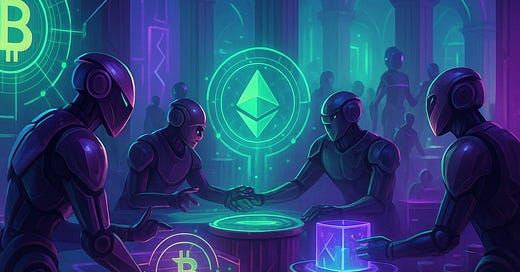AI & Crypto, Past, Present and Future – Day 83, Agent Coordination in DeFi: From Competition to Collaboration
How multi-agent systems are transforming onchain trading, liquidity, and governance.
For most of DeFi’s history, the narrative has been about individual agents—bots, arbitrageurs, and algorithmic traders—competing for profit. As the space evolves, we are beginning to see a shift: multiple agents coordinating strategies, sharing information, and even forming alliances to optimise outcomes across protocols. Multi-agent systems are moving from theory to production, enabling new forms of market making, liquidity management, and governance in onchain finance.
1. Why Agent Coordination Matters Now
Single-agent strategies have reached their natural limits in efficiency and scalability. With more protocols, higher volatility, and increased onchain activity, opportunities emerge for agents to collaborate. These collaborations can mean sharing order flow, pooling liquidity, or even negotiating risk parameters. By working together, agents can unlock market efficiencies that isolated actors cannot reach alone.
2. Autogen: Multi-Agent Workflows for Crypto
Microsoft’s Autogen framework is a toolset for building and simulating multi-agent systems. It allows developers to create agents with specific goals, memory, and communication protocols. In a DeFi context, Autogen can be used to model a network of trading bots that coordinate trades, share price signals, and optimize portfolio allocation in real time. This sort of agent teamwork can reduce onchain congestion, smooth out volatility, and improve market depth.
Explore Autogen
3. AgentVerse: Simulating and Benchmarking Coordination
AgentVerse is an open-source platform for benchmarking and simulating multi-agent collaboration. By providing standardized tasks and environments, AgentVerse helps researchers and developers measure how well agents cooperate in tasks like liquidity provision, arbitrage, or governance voting. These environments are critical for stress-testing DeFi protocols, ensuring that agent coordination leads to more resilient and efficient markets, rather than new attack vectors.
Learn more about AgentVerse
4. Uniswap V4 Hooks: Coordination at the Protocol Layer
Uniswap V4 introduces "hooks," custom smart contract extensions that allow agents to coordinate liquidity provision, fees, and risk management on the fly. Instead of each LP acting in isolation, agents can pool resources, automate rebalancing, and coordinate strategies in response to onchain events. This opens up new avenues for collaborative market making and enables real-time adaptation to volatile market conditions.
5. Coordination Primitives in Action
In practical terms, multi-agent coordination enables:
Cooperative trading: Agents can split order flow to minimize slippage or front-running
Liquidity syndication: LP agents can pool capital and adjust exposure collectively
Onchain negotiation: Agents can negotiate parameters for lending, governance, or insurance
Real-time communication: Agents use onchain messages or offchain signals to react to market changes instantly
The result is a more adaptive and resilient financial ecosystem, where agents compete when it makes sense, but also cooperate to maximise shared outcomes.
6. Risks and Open Challenges
As with any shift in market structure, coordinated agents create new risks:
Cartelization: Colluding agents could manipulate prices or fees
Complexity: Multi-agent workflows can become opaque, making monitoring and auditing more difficult
Coordination failures: Poorly designed communication can lead to deadlocks or unintended cascading effects
Protocols are addressing these issues by implementing transparency requirements, designing permissioned coordination spaces, and using simulation platforms like AgentVerse to model emergent behavior.
7. What’s Next for Agent Coordination
Expect to see:
Collaborative DAOs: Governance structures where agents vote as coalitions or syndicates
Composability of agent networks: Plug-and-play agents that can join or leave coordinated teams without disrupting markets
Standardized communication protocols: Reliable messaging layers for secure and efficient coordination
These trends will drive DeFi towards more efficient markets, lower volatility, and more sophisticated automated strategies.
8. Reflection
DeFi is entering an era where coordination is just as important as competition. Multi-agent systems are not only making markets more efficient, but also introducing new forms of collaboration that unlock value for everyone involved. As onchain infrastructure matures, expect agent alliances, coordinated liquidity, and real-time negotiation to become standard features in the financial stack.
Hasta manana
Cpt




